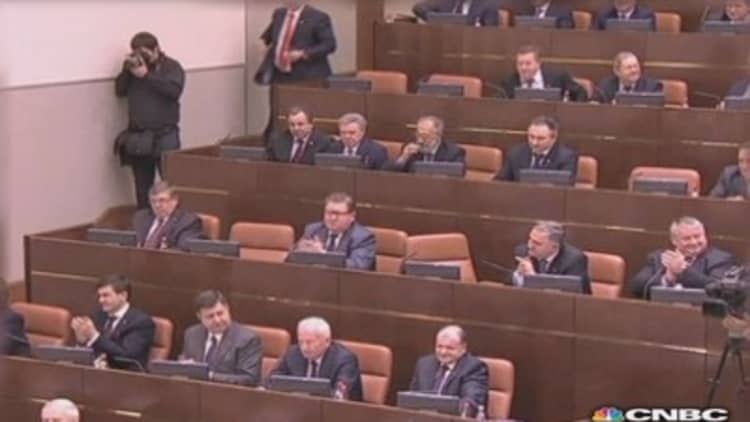Between authorizing Russian President Vladimir Putin to use military force in Crimea and then asking , the country's lower house of parliament is busy trying to pass laws that may seem strange to the Western eye.

The State Duma has, for example, been working to outlaw dogs from barking, ban children from crying after a certain time and trying to bar women from wearing certain types of underwear.
Yelena Mizulina, head of the Committee on Family, Women, and Children and a member of Putin's United Russia party, recently proposed that Russians should have access to the Internet only upon the presentation of a passport.
Read MoreAdidas shares plunge 13% after Russia warning
Her rationale: protecting children from pornography and other malicious things found on the world wide web, Mizulina says.
This proposal has not yet gone to a vote. A website registry with banned sites already exists in Russia.
Mizulina also authored the controversial law banning homosexual "propaganda," adopted before the Sochi Olympics, which caused some to call for a boycott of the games.
Another piece of anti-gay legislation, introduced in September 2013 by deputy Alexei Zhuravlev, would change Article 69 of the Family Code of the Russian Federation to include withdrawing parents' rights for any of their children "who became gay."
Heterosexual relationships seem to be OK, as long as women are wearing the right underwear. Russian MP Mikhail Serduk championed a law banning lacy lingerie in Russia, which came into force on July 1. It is now technically forbidden to produce and sell lace panties and bras in Russia, though the ban affects only synthetic underwear.
Read More Lingerie for the 1 percent: 24-karat intimates
Another colorful proposal from Mikhail Degtyarev of the Liberal Democratic Party would ban children from crying and dogs from barking after 10 p.m.
That proposal was later withdrawn.
—By CNBC's Dina Gusovsky


